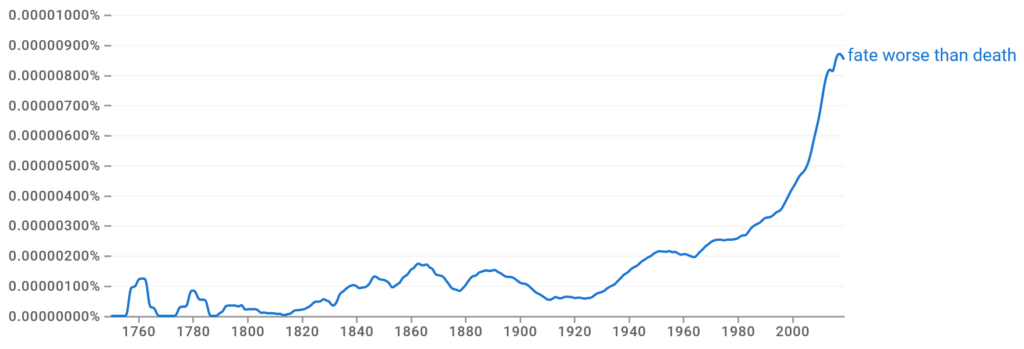A fate worse than death is an idiom that refers to a situation or outcome perceived as extremely undesirable or unbearable. It suggests that facing certain hardships or challenges may be more distressing than death itself.
Idioms such as a fate worse than death are phrases or expressions with meanings that go beyond the literal interpretation of their individual words. They contribute to the richness of the English language, enabling more nuanced expression and fostering effective communication in various social and cultural contexts.
This article explores the meaning of a fate worse than death, delving into its proper usage and intriguing origins. It also offers practical tips for effectively incorporating it into your material, examples of its application, and some related terms and phrases.
Keep reading to gain a deeper understanding of this idiom, and challenge yourself with a quick quiz at the end to solidify your newfound knowledge.

What Does the Idiom a Fate Worse Than Death Mean?
The idiom a fate worse than death describes something too horrible to bear—so unbearable that an individual might prefer death over enduring it. This saying is all about strong feelings and how a person sees a really terrible situation at the moment it’s happening.
Cambridge Dictionary defines the idiom as “something you do not want to experience because it is so unpleasant.” Moreover, Merriam-Webster simply explains that it is “something worse than dying.”
For example, when I set specific limits to gaming and internet use at home, my oldest child seriously felt like my decisions were a fate worse than death. But, within a week, he was already doing better at school and admitted it wasn’t so bad after all. He even apologized for his initial reaction.
How Is a Fate Worse Than Death Commonly Used in Context?
The idiom vividly captures the idea of an extremely dreadful situation, highlighting the intensity of emotions tied to undesirable circumstances. In the upcoming sections, explore the various ways this expressive phrase is commonly employed, discover real-world examples that illustrate its usage, and find practical tips to use it effectively in your language.
What Are the Different Ways to Use a Fate Worse Than Death?
Explore the versatility of this idiom in various situations, from casual conversations to more formal contexts.
- Describing extreme unpleasantness: “To him, attending that boring seminar was a fate worse than death.”
- Highlighting personal preferences: “For a coffee enthusiast, drinking decaf might be considered a fate worse than death.”
- Expressing intense disapproval: “Being stuck in traffic during rush hour is a fate worse than death for most commuters.”
- Emphasizing unbearable choices: “For someone who loves the outdoors, being confined to a desk job may feel like a fate worse than death.”
- Relating to personal thresholds: “For a social butterfly, spending a weekend alone might be considered a fate worse than death.”
- Creating hyperbolic comparisons: “To a chocolate lover, a world without chocolate is a fate worse than death.”
Where Can You Find Examples of a Fate Worse Than Death?
Whether in literature, everyday conversations, or the humor of comedians, the idiom a fate worse than death finds expression in various forms. Here are some contexts where you can observe the idiom’s usage:
- Literature
- Movies and TV shows
- Conversations and everyday language
- Online content
- Quotes and proverbs
- Comedy and humor
Online newspaper editorials and reporting often employ the phrase to highlight the intensity of a situation:
And if you consider being pulled up on stage a fate worse than death, well, at least we were given the opportunity for sweet revenge. (The Advertiser)
Death row is a fate worse than death. (Florida Today)
What Are Some Tips for Using a Fate Worse Than Death Effectively?
The following tips can help emphasize the correct impact you want to convey in your material:
- Understand the context: Familiarize yourself with the specific situation you are describing.
- Use it sparingly: The idiom is impactful and best used when the stakes are genuinely high or the outcome is truly dire.
- Consider your audience: It is a widely recognized expression, but it’s still important to ensure that your audience understands its meaning.
- Be consistent in tone: The idiom can be used in serious or lighthearted contexts, depending on the overall tone of your conversation or writing.
- Provide context if needed: This can help others understand your intended meaning and avoid confusion.
- Use it figuratively if appropriate: While the idiom typically refers to extreme or undesirable outcomes, it can also be used metaphorically to describe situations that are not literally life-threatening.
What Is the Origin of the Idiom a Fate Worse Than Death?

The origin of the idiom a fate worse than death dates back to the late 18th and early 19th centuries and is mostly associated with the gothic novel era.
It was often used in such literature to refer to a woman’s loss of honor, usually through sexual assault or seduction by deceit. This view was expressed in Gibbon’s The History of the Decline and Fall of the Roman Empire, published in 1781:
“The matrons and virgins of Rome were exposed to injuries more dreadful, in the apprehension of chastity, than death itself.”
By the 20th century, the expression became popularized in literature, first appearing in its modern context in the novel Tarzan of the Apes by Edgar Rice Burroughs, published in 1914:
“[The ape] threw her roughly across his broad, hairy shoulders, and leaped back into the trees, bearing Jane Porter away toward a fate a thousand times worse than death.”
By this time, the expression’s use wasn’t as strongly connected to a woman’s worth, but the connection was still implied.
How Did the Idiom Evolve Over Time?
Over time, it has become used in a much less serious manner. Today, the idiom a fate worse than death is most often used in a humorous way, describing something that is merely embarrassing. However, it may describe any fate that is too horrible to bear.
What Are Some Related Terms to a Fate Worse Than Death?
Consider using synonyms or related phrases to the expression a fate worse than death, especially when expressing seriousness.

Synonyms
- A destiny more dreadful than demise
- A circumstance more crippling than annihilation
- A consequence more cruel than ceasing to exist
- Unthinkable outcome
- Unspeakable fate
- Dreadful consequence
- Horrific destiny
Antonyms
These antonyms convey the idea of an outcome or circumstance that is considered highly desirable, pleasant, or filled with happiness:
- Blissful outcome
- Idyllic fate
- Serene consequence
- Wonderful destiny
- Pleasant future
- Joyful end
A Fate Worse Than Death: Test Your Knowledge!
Choose the correct answer.
What Have We Learned about a Fate Worse Than Death?
The idiom a fate worse than death captures the intensity of a situation or outcome considered extremely undesirable or unbearable. It’s an expression commonly used in literature, movies, and everyday conversations to emphasize the severity and aversion associated with certain circumstances.
The idiom serves as a tool to evoke strong emotions and highlight the immense fear or aversion that individuals may have towards particular scenarios. In the modern context, it is often used as hyperbole and may exaggerate emotions. Its overuse in recent years has made it something of a cliche as well, so be wary of how you use it in your communication.
Enjoyed reading about this idiom? Check out some others we covered:
